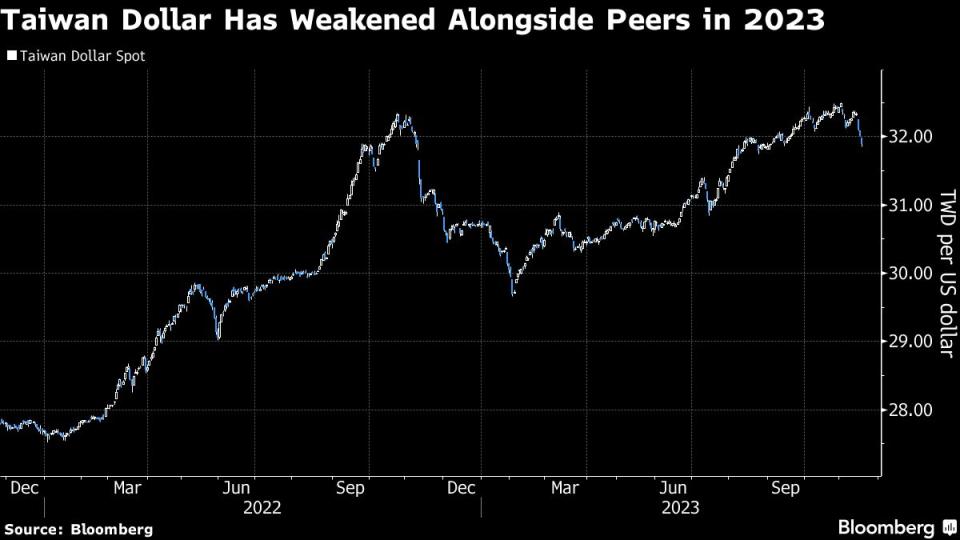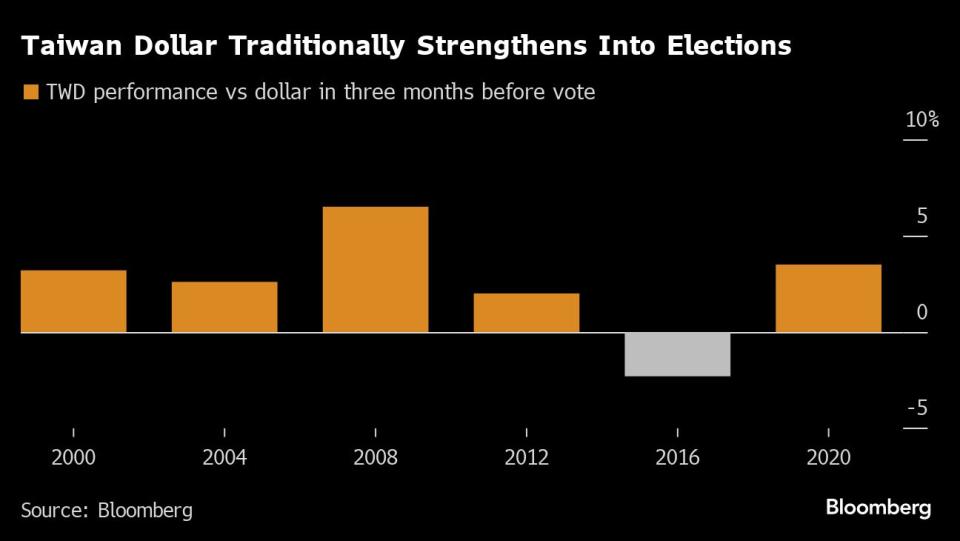History Shows Taiwan Dollar Can Ride Election Sentiment Swings
(Bloomberg) -- As Taiwan investors mull the will-they won’t-they tie-up of opposition candidates into January’s closely-watched election, history suggests some gains may still lie ahead for those willing to bet on the local dollar going into the poll.
Most Read from Bloomberg
The Doomed Mission Behind Sam Altman’s Shock Ouster From OpenAI
Citigroup Cuts Over 300 Senior Manager Roles in Latest Restructuring
Nearly All of OpenAI Staff Threaten to Go to Microsoft If Board Doesn’t Quit
Tech Giants Roar as Nasdaq 100 Hits 22-Month High: Markets Wrap
Only once ahead of the last six elections did the Taiwan dollar weaken against its US counterpart in the three months before the vote, according to Bloomberg calculations, a decline of about 2% in 2016. On the other five occasions it strengthened an average 3.6%. Starting the stopwatch three months before this coming election day, it is up about 1%.
Global investors are keeping a close eye on the potentially market-disrupting vote given Taiwan’s status as a potential flashpoint between China and the US. China sees its eventual control of the self-governed island as a national security issue and doesn’t rule out the use of force to make it happen.
Early jitters of a frontrunner viewed with suspicion by Beijing had given way to some relief from investors that a more China-friendly government could take power in Taipei next year. But talks between the Kuomintang and Taiwan People’s Party have stumbled, after they announced plans to run a united campaign last week, something which would be a setback for the ruling Democratic Progressive Party.
A coalition “should make the election there much more interesting and there are some short Taiwan dollar hedges being unwound now as the story continues to develop,” said Jefferies LLC strategist Brad Bechtel before the weekend’s discussions failed to form a joint ticket. “A pro-China candidate would be the preferred one from a market perspective regardless of your geopolitical bent and if that person does indeed become the new leader we could have some type of run in the Taiwan dollar.”
Taiwan Opposition Agrees to Joint Bid, Reshaping Election
Beyond politics, the currency gains before past elections have often been impacted by local and global seasonal factors. Taiwan elections usually come at the beginning of a new year and toward the end of the previous one, when the local currency is supported by factors like US dollar sales to pay salaries and bonuses and for procurement payments.
The Taiwan dollar rallied to a two-month high of just under the 32 level against the greenback on Friday. It is down almost 4% this year, thanks to a large interest-rate differential with the US and increased use of the currency to fund so-called carry trades.
“The election gave people more reason to short Taiwan dollar on the back of a large rate differential,” said Lemon Zhang, strategist at Barclays. “It’s a negative yielding currency. It’s a good funding currency in that way.”
Taiwan dollar bulls will be hoping this week’s export data bolsters the case that demand for the island’s tech products is rebounding. Meanwhile, the US dollar has been under pressure as investor bets spread that the Federal Reserve will cut interest rates by mid-2024, after mixed economic data.
Still, Goldman Sachs Group Inc. is sticking with a cautious view on Taiwan’s currency, thanks in part to the political situation, according to its recent outlook for 2024 from analysts including Danny Suwanapruti.
“Taiwan’s exports should also improve, but political uncertainty ahead of the general elections in January, ongoing supply chain shifts and persistent equity outflow will likely restrain the TWD’s outperformance,” the Goldman team wrote.
Here are the key Asian economic data due this week:
Monday, Nov. 20: China 1- and 5-year loan prime rates, Thailand GDP, Malaysia trade data, Taiwan export orders and current account balance, Philippines balance of payments
Tuesday, Nov. 21: Hong Kong CPI, South Korea PPI and 20-day imports/exports, New Zealand trade balance, RBA November meeting minutes
Wednesday, Nov. 22: Singapore GDP
Thursday, Nov. 23: Singapore CPI, Taiwan industrial production, Bank Indonesia policy decision
Friday, Nov. 24: Japan CPI and PMIs, New Zealand retail sales, Malaysia CPI
--With assistance from Chien-Hua Wan and Betty Hou.
Most Read from Bloomberg Businessweek
More Americans on Ozempic Means Smaller Plates at Thanksgiving
The Share of Americans Who Are Mortgage-Free Is at an All-Time High
Inflation Raging in Triple Digits Is Pushing Argentina Down a Radical Path
The Impact and Cost of Musk’s Endorsement of Antisemitism on X
At REI, a Progressive Company Warns That Unionization Is Bad for Vibes
©2023 Bloomberg L.P.




